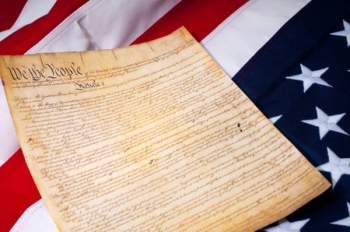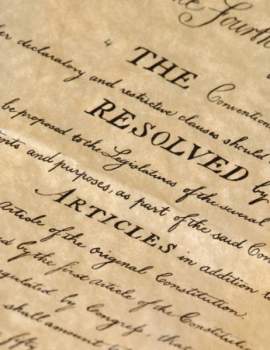
The Basis of Constitutional Law Overview

Popular In Constitution
Purpose Of Lifetime Appointment And Pros And Cons Enumerated Powers Bicameral Legislature Background Article 3 Of The Constitution We The People 1st Amendment Who Wrote The Constitution Judicial Review Equal Protection Clause 5th Amendment 10th Amendment Three Fifths Compromise
The basis of American law and governance derives from the United States Constitution and the various Amendments made to it and judicial decisions made in relation to it. The Constitution places power in the two houses of Congress and the judicial and executive branches. Laws passed in the United States must be shown to fall within the limits and privileges described by the Constitution.
The Constitution places power with the aforementioned governmental bodies but does so with a view to benefiting the general mass of citizenry, and to this end understands governmental power as essentially deriving from the consent and "natural rights" of the governed as opposed to prior models which had flourished in Europe and elsewhere in which political power was understood in a strictly hierarchical sense, deriving originally from a supreme being and then flowing down to a monarch, who could thus dispense it to various supporters in order to exercise it over subjects. The natural rights idea helped orient the Constitution more toward the goodwill of its subjects and less to the maintenance of power for its own end.
The conception of natural rights in the Constitution was employed in part to fulfill a political project of guaranteeing the recently arrived communities of people in the Americas the ability to determine their own actions, but it came into use due to its prevalence in the era's intellectual and political culture. It reflected the influence of scientific inquiry and global exploration on the European intellectual tradition, which had previously been dominated by classical philosophy and Christian theology.
Rather than simply asserting what would now be termed human rights, the Constitution proposed a specific idea about the early condition of the human race with its language of "natural rights." The basic proposal offered by this concept is that human beings are naturally disposed toward specific kinds of behavior that in a "state of nature," one without governance and other large institutions for ordering behavior, occur without restriction. A basic purpose of government, then, is to limit its effect on the citizenry it governs, while making provisions for the other forms of restrictions which other kinds of organizations may place on these innate and basic rights.
The procedural and ideological basis for the Constitution derived from disparate sources. The work of intellectual figures of the last few centuries, including the Englishman John Locke and the Frenchman Montesquieu, influenced the drafters both on the larger intellectual theories lying behind the Constitution and the specific procedural forms such ideas were placed in, such as the tripartite division of government functions. Some of the specific language on rights, though established as priorities by recent European intellectual trends, had been enjoyed in some form or another in the colonies' former ruler of England since the Middle Ages or the Renaissance, such as due process.
The dependence of the Constitution on the approval of the thirteen states meant that their practical needs were also taken into consideration and their status as discrete entities respected in the legal language.
NEXT: What Is The Constitution Function



















